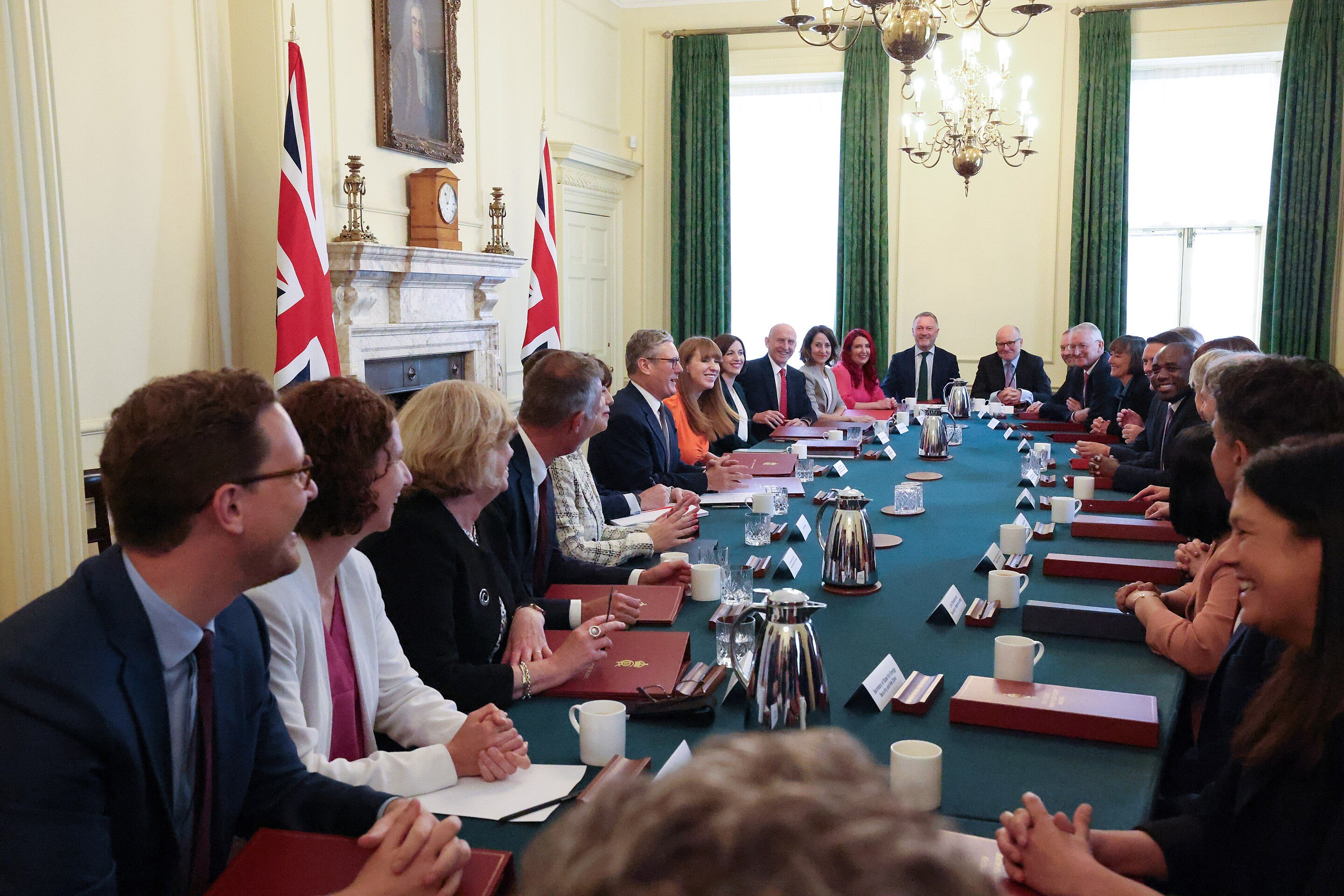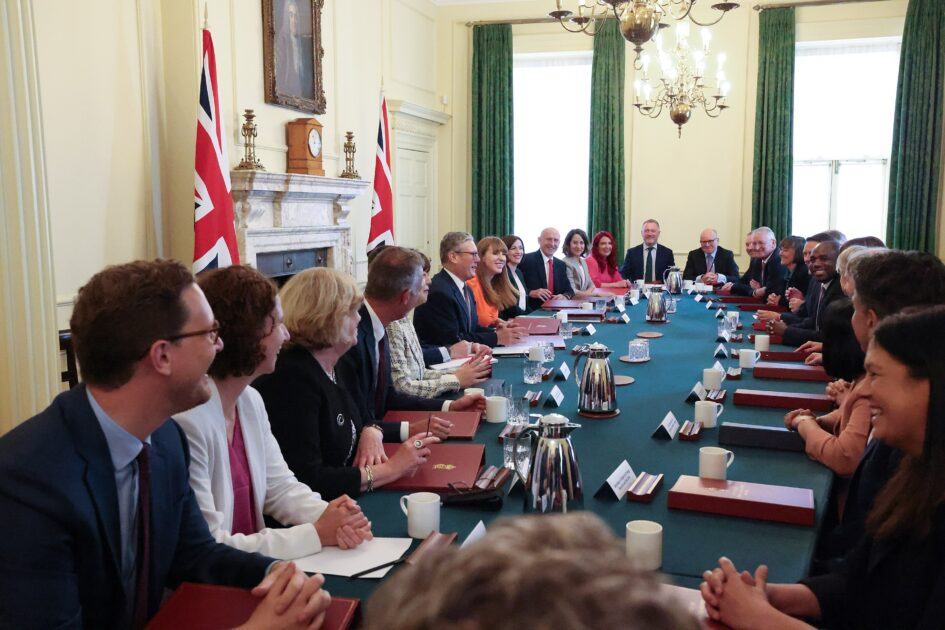






























































Photograph Source: Lauren Hurley / No 10 Downing Street – OGL
In England last week, in addition to a byelection for a parliamentary seat in Runcorn, Cheshire, there were 6 mayoral elections, elections for 24 local councils. and 1,641 seats in these 24 councils. All seats on 14 county councils and eight unitary authorities in England were up for election. Most of these seats were last contested at the 2021 local elections. The 2025 local elections were the first to follow the general election 10 months ago.
The Runcorn byelection was caused by the resignation of its Labour MP, Mike Amesbury, who quit after receiving a suspended prison sentence for punching a constituent to the ground when drunk, and following up the initial assault with 5 further punches (according to CCTV video of the incident).
Labour lost the Runcorn byelection to Nigel Farage’s hard-right Reform party by a mere 6 votes, surrendering its previous majority of 14,700 votes in one of its safest seats. Many customary Labour voters– vexed by having to go to the polls on account of the fisticuffs of their bibulous ex-MP— stayed at home this time and thus made all the difference. Moreover, Starmer’s decision not to visit Runcorn in the run-up to the byelection was an obvious contrast to Farage who visited the constituency 3-4 times and knocked on doors on polling day. Labour was largely passive while Reform turned out its electoral machine.
Overall, Labour lost two-thirds of the seats it was defending– its vote fell on average by as much as 19 points.
The Labour postmortem indicated clearly that its lacklustre record after 10 months in office has had a chilling effect on many of its core supporters. There have been constant rows over Labour’s failure to eliminate the two child benefit cap imposed by the Tories when they were in power; as well as the closing-down of the winter fuel supplementary payment given to pensioners, the slashing of disability benefits, the backtracking on policies dealing with the climate crisis, the party’s much-publicized thirst for freebies from donors, and the refusal to take a firm stance against Israel over Gaza. The Labour Chancellor of the Exchequer/finance minister, Rachel Reeves, has also warned of further cuts to public services.
Starmer’s rigidity on these issues (some have called it his “tin ear” or emotional illiteracy) alienates progressive voters, many of whom can’t discern a sliver of socialism in Labour’s policies.
Starmer and his team have chosen to address the UK’s economic ailments by pursuing growth, not by introducing taxes on the wealthy and increasing public expenditures, but by creating a financial climate supposed to encourage the private sector to make the requisite investments in growth-inducing economic activities. This approach will not be easy—for one thing, the private sector is struggling with the Brexit drag on production, as costs increase and supply chains get disrupted. Starmer refuses to talk about Brexit, for fear of firing up those who voted Leave in the 2016 referendum. Labour optimists however remind us that the next election is not for another 4 years, and that Labour will have its huge parliamentary majority until then, giving it the time needed to prime the economy for improvement.
In addition to picking up a parliamentary seat and gaining control of 10 councils, Reform also performed well in other areas, especially by winning 674 council seats. Reform are now in second place in most Labour and Lib Dem seats giving them a headstart as putative change candidates in the future. Reform’s advance was especially devastating for the Conservatives, who lost more to Reform than Labour did. The Tories lost 674 councillors, and their uninspiring leader, Kemi Badenoch, had to apologize for this “bloodbath”.
The centrist Lib Dems also picked up seats from the Tories. Clearly a major realignment is occurring on the UK’s political right, though it’s much too early to say what its final forms will be. The Tories have decided to play “catch up” with Reform, and tacked towards Nigel Farage, albeit with little success. An ersatz move to the populist right is no match for Farage’s genuine item.
Labour has also tacked towards Reform, with the outcome that there are 3 parties now vying for the same rightwing spot. The Lib Dems, typically viewed as a centrist party, is now more to the left than Labour. But further twists lie ahead.
Reform, committed to a Trumpist agenda, will rein-in diversity, equity and inclusion (DEI), back-pedal on measures to tackle climate change, adopt lower rates of taxation, as well as ending working from home. How congenial will this be for erstwhile Labour supporters now backing Reform?
An Apella poll conducted after the elections found Reform voters to be in favour of a sturdily interventionist, leftwing economic prospectus, including nationalizing utilities, raised taxes on corporations, a well-funded NHS, and for Britain to adopt protectionist measures in order to shield local industries from foreign competition. The primary common ground between these voters and their party leadership is of course immigration, as well as the nationalization of utility companies. Apart from that, viewpoints start to diverge. For instance, Farage favours an insurance-based healthcare system using vouchers, lower corporate taxes, and reduced government spending. The biggest shift will be in climate policy– Reform will abandon existing carbon emission targets, accelerate North Sea oil and gas licences, scrap annual green energy subsidies, and speed up “clean” nuclear power. Defence spending will be increased.
None of this has been costed. For instance, it is already being asked how increased defence spending will be paid for when taxation is being reduced at the same time?
The other question concerns Farage’s leadership. It has been said he has several qualities in common with Trump—narcissism, vanity, petulance, the ability to bullshit, grifting, and fickleness, to name a few. As a result he treats the Reform party as a personal fiefdom, which could become an issue when it expands its membership and increases its representation on electoral bodies. Reform will then have to become more than a one-man show.
The Tory party having imploded, Labour will be waiting to see if the same happens to Reform.
The post Disaster For Labor and Tories in English Local Elections appeared first on CounterPunch.org.
This post was originally published on CounterPunch.org.